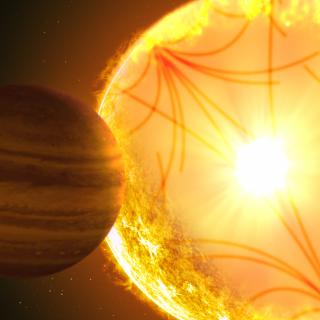Bibcode
Bordé, P.; Bouchy, F.; Deleuil, M.; Cabrera, J.; Jorda, L.; Lovis, C.; Csizmadia, S.; Aigrain, S.; Almenara, J. M.; Alonso, R.; Auvergne, M.; Baglin, A.; Barge, P.; Benz, W.; Bonomo, A. S.; Bruntt, H.; Carone, L.; Carpano, S.; Deeg, H. J.; Dvorak, R.; Erikson, A.; Ferraz-Mello, S.; Fridlund, M.; Gandolfi, D.; Gazzano, J.-C.; Gillon, M.; Guenther, E.; Guillot, T.; Guterman, P.; Hatzes, A.; Havel, M.; Hébrard, G.; Lammer, H.; Léger, A.; Mayor, M.; Mazeh, T.; Moutou, C.; Pätzold, M.; Pepe, F.; Ollivier, M.; Queloz, D.; Rauer, H.; Rouan, D.; Samuel, B.; Santerne, A.; Schneider, J.; Tingley, B.; Udry, S.; Weingrill, J.; Wuchterl, G.
Referencia bibliográfica
Astronomy and Astrophysics, Volume 520, id.A66
Fecha de publicación:
9
2010
Revista
Número de citas
58
Número de citas referidas
49
Descripción
Aims: We report the discovery of CoRoT-8b, a dense small
Saturn-class exoplanet that orbits a K1 dwarf in 6.2 days, and we derive
its orbital parameters, mass, and radius. Methods: We analyzed
two complementary data sets: the photometric transit curve of CoRoT-8b
as measured by CoRoT and the radial velocity curve of CoRoT-8 as
measured by the HARPS spectrometer. Results: We find that
CoRoT-8b is on a circular orbit with a semi-major axis of 0.063 ±
0.001 AU. It has a radius of 0.57 ± 0.02 RJ, a mass of
0.22 ± 0.03 MJ, and therefore a mean density of 1.6
± 0.1 g cm-3. Conclusions: With 67% of the size
of Saturn and 72% of its mass, CoRoT-8b has a density comparable to that
of Neptune (1.76 g cm-3). We estimate its content in heavy
elements to be 47-63 {M}_⊕, and the mass of its hydrogen-helium
envelope to be 7-23 {M}_⊕. At 0.063 AU, the thermal loss of
hydrogen of CoRoT-8b should be no more than 0.1% over an assumed
integrated lifetime of 3 Ga.
Observations made with SOPHIE spectrograph at Observatoire de Haute
Provence, France (PNP.07B.MOUT), and the HARPS spectrograph at ESO La
Silla Observatory (081.C-0388 and 083.C-0186). The CoRoT space mission,
launched on December 27, 2006, has been developed and is operated by the
CNES with the contribution of Austria, Belgium, Brasil, ESA, Germany,
and Spain.Both data sets are available in electronic form at the CDS via
anonymous ftp to cdsarc.u-strasbg.fr (130.79.128.5) or via http://cdsarc.u-strasbg.fr/viz-bin/qcat?J/A+A/520/A66
Proyectos relacionados

Sismología Solar y Estelar y Búsqueda de Exoplanetas
Los objetivos principales de este proyecto son: 1) estudiar la estructura y la dinámica del interior solar, 2) ampliar este estudio a otros tipos de estrellas y 3) buqueda de planetas extrasolares utilizando métodos fotométricos y su caracterización con información complementaria (espectrometría). Para alcanzar el primer objetivo, utilizamos la
Savita
Mathur